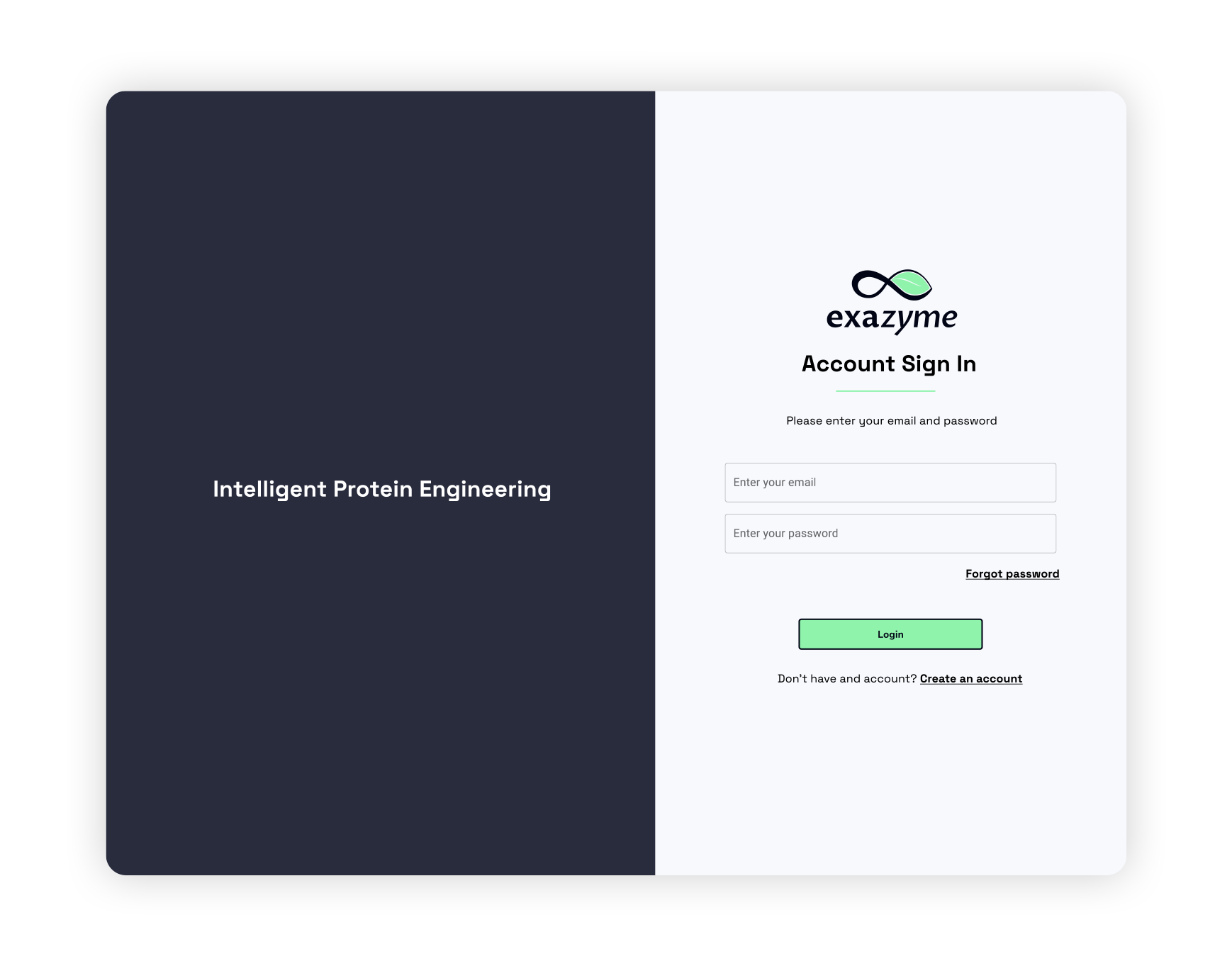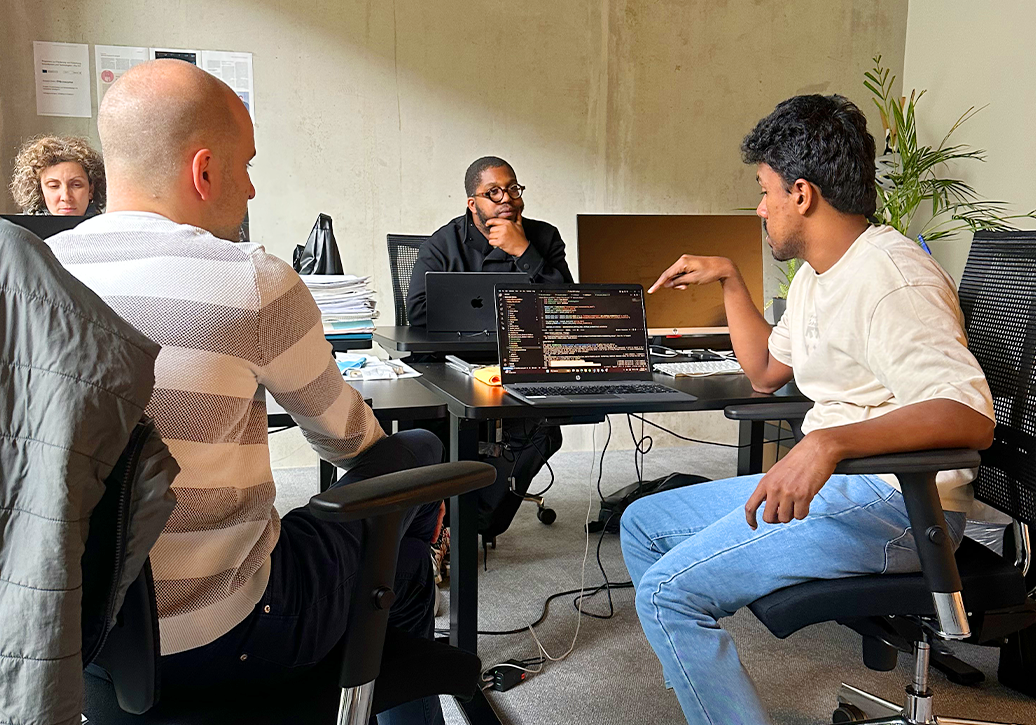Web Portal
Mobile Applications

Exazyme GmbH (now Provolut), a Berlin-based biotech startup funded by BMWi and the European Social Fund, is reshaping the future of protein analysis. Founded by PhDs in Chemistry and AI, Exazyme is building on years of academic research to pioneer an AI-driven protein design tool capable of exploring the entire protein search space. The breakthrough lies in its ability to achieve optimal results with 100 times fewer experiments than traditional methods, a step change in cost and efficiency for drug discovery and biotechnology.
The ambition was to turn this research-driven innovation into a secure, user-friendly SaaS platform that could serve biotech companies, labs, and pharmaceutical innovators worldwide. But the founders faced critical hurdles. Without in-house software architects or the engineering capacity to build a production-grade system, the challenge was not about proving the science but scaling it. And because Exazyme operates in Europe, the solution also had to meet GDPR standards from day one, ensuring compliance and trust among scientific and commercial users.

We began the collaboration by working closely with the founders to co-define the product roadmap, ensuring we balanced speed to market with long-term scalability. The goal was clear: launch a minimum viable product (MVP) quickly, without cutting corners on security, compliance, or performance. This agile roadmap set the stage for an iterative build, allowing Exazyme to showcase the platform to early partners and investors while steadily adding functionality.
At the heart of this roadmap was trust by design. We embedded GDPR compliance into the architecture from the beginning. Everything from user authentication and data storage to access protocols was designed with privacy-first principles, so scientific users could handle sensitive protein data with full confidence. By addressing compliance up front, we ensured the platform would be market-ready not just in Germany but across Europe and beyond.
.png)
With the roadmap in place, we focused on execution. To support Exazyme’s fast-paced research environment, we established automated DevOps pipelines that allowed the team to deploy new features frequently and reliably. This gave Exazyme the agility to test ideas quickly while maintaining platform stability. Continuous integration and delivery (CI/CD) ensured that updates moved smoothly from research prototypes to production environments.
Quality was non-negotiable. We implemented a rigorous QA framework that validated not only functionality but also usability for scientists. This meant testing for accuracy, precision, and stability at every release. The platform had to feel seamless for researchers running complex protein data sets, while also being resilient enough to handle increasing workloads as adoption grew.
For over 12 months, our dedicated remote engineering team worked as an extension of Exazyme. Based in Sri Lanka, our developers, DevOps engineers, and QA specialists collaborated daily with Exazyme’s scientific team in Berlin. This cross-continental collaboration bridged disciplines, aligning software development with the workflows of biotechnology research. By embedding ourselves into Exazyme’s process, we ensured that the product evolved hand-in-hand with the science, creating a tool that scientists could truly rely on.
With the roadmap in place, we focused on execution. To support Exazyme’s fast-paced research environment, we established automated DevOps pipelines that allowed the team to deploy new features frequently and reliably. This gave Exazyme the agility to test ideas quickly while maintaining platform stability. Continuous integration and delivery (CI/CD) ensured that updates moved smoothly from research prototypes to production environments.
Quality was non-negotiable. We implemented a rigorous QA framework that validated not only functionality but also usability for scientists. This meant testing for accuracy, precision, and stability at every release. The platform had to feel seamless for researchers running complex protein data sets, while also being resilient enough to handle increasing workloads as adoption grew.
For over 12 months, our dedicated remote engineering team worked as an extension of Exazyme. Based in Sri Lanka, our developers, DevOps engineers, and QA specialists collaborated daily with Exazyme’s scientific team in Berlin. This cross-continental collaboration bridged disciplines, aligning software development with the workflows of biotechnology research. By embedding ourselves into Exazyme’s process, we ensured that the product evolved hand-in-hand with the science, creating a tool that scientists could truly rely on.
The partnership delivered more than a functioning product. Together, we created a robust SaaS platform that exceeded expectations, transforming Exazyme’s AI protein design tool from a research prototype into a market-ready biotech solution. The platform matured from MVP to a continuously evolving system, enabling researchers to explore protein design with efficiency and confidence.
The success of the platform directly contributed to Exazyme’s €2 million seed funding round, securing the resources needed to scale operations and expand research. This validation underscored not just the scientific innovation but also the engineering foundation that made the platform viable for real-world use.
Most importantly, the collaboration proved the strength of a remote dream team model. By combining Exazyme’s scientific brilliance with our engineering expertise, we showed how biotech startups can overcome capacity gaps and accelerate time-to-market. The result is more than just a platform for protein analysis. It is a model for how scientists and engineers can work seamlessly together to transform bold research into scalable biotech solutions, pushing the boundaries of what is possible in protein design.
The partnership delivered more than a functioning product. Together, we created a robust SaaS platform that exceeded expectations, transforming Exazyme’s AI protein design tool from a research prototype into a market-ready biotech solution. The platform matured from MVP to a continuously evolving system, enabling researchers to explore protein design with efficiency and confidence.
The success of the platform directly contributed to Exazyme’s €2 million seed funding round, securing the resources needed to scale operations and expand research. This validation underscored not just the scientific innovation but also the engineering foundation that made the platform viable for real-world use.
Most importantly, the collaboration proved the strength of a remote dream team model. By combining Exazyme’s scientific brilliance with our engineering expertise, we showed how biotech startups can overcome capacity gaps and accelerate time-to-market. The result is more than just a platform for protein analysis. It is a model for how scientists and engineers can work seamlessly together to transform bold research into scalable biotech solutions, pushing the boundaries of what is possible in protein design.